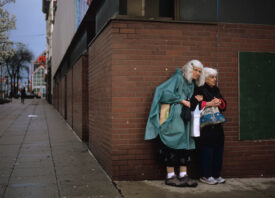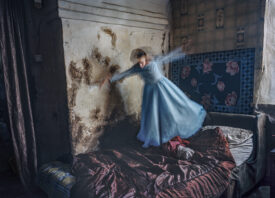Search this site
A Public Exhibition Celebrates The Beauty and Transcendence of the Black Body

Mikael Owunna was born in Pittsburgh, and his family moved there permanently when he was just three years old. Some of his earliest memories include large gatherings with extended family, pool days with cousins, and movie nights at Flagstaff Hill in the summertime. By the late 1990s, many of his family members moved away, but his aunt and her children remained, as did Owunna and his mother.
After completing college at Duke University and living in Taiwan and Washington, D.C., Owunna returned to Pittsburgh in 2017. Now an internationally renowned photographer, Owunna is preparing for a landmark public exhibition in the city he calls home. Curated by Larry Ossei-Mensah, the show will feature images from Infinite Essence, the artist’s project centering Black bodies as immortal, limitless, and divine.
At a traumatic moment in American history, with violent images depicting the murders of Black people at the hands of police having appeared on the front pages of newspapers across the nation, Owunna’s work transforms the body into a tapestry of stars, immense and everlasting. In the process, he evokes the mythologies and histories passed down from generation to generation as part of the Igbo and Dogon traditions.
To create his glittering constellations, the artist starts by hand-painting his models’ bodies with fluorescent paint (each person chooses the colors they want) before moving into complete darkness. From there, he illuminates them with a self-engineered camera flash, designed to transmit only ultraviolet light. “At its genesis, this project began as a response to images of police killings of Black people, as I sought to transfigure Black bodies from sites of death and state violence into vessels of eternal life,” Owunna remembers.
The public art campaign, titled Infinite Essence: Celestial Liberation, will run across Pittsburgh from June 18th to 30th, coinciding with celebrations of Juneteenth. This year marks the first time in history that the city will recognize the public holiday, commemorating the day in 1865 when the end of slavery was announced in Texas. Created in collaboration with Orange Barrel Media, the campaign will see photos from Infinite Essence exhibited on digital billboards and kiosks throughout Pittsburgh, accompanied by virtual and in-person events.
In anticipation of the event, we asked Owunna and Ossei-Mensah to tell us about the project, its evolution, and the significance of bringing this work to Pittsburgh. As we exchanged emails, the US Senate unanimously passed a bill designating Juneteenth National Independence Day as a federal holiday.

Can you tell me about some of the early inspirations for the project?
Mikael Owunna: “As I developed the visual language for the project, the first breakthrough came as I read the words of Chinua Achebe in his essay, Chi in Igbo Cosmology, as he explored the Igbo concept of the ‘chi’ within Igbo spiritual science. As an Igbo man, I was struck by this line in particular, ‘Or is chi an infinitesimal manifestation of Chukwu’s [the supreme being of the Igbo spiritual system] infinite essence given to each of us separately and uniquely, a single ray from the sun’s boundless radiance?’
“Achebe’s framing of ‘infinite essence’ became the guiding framework for the series. Since that moment in 2016, I have progressively deepened my research and exploration of first Igbo and then Dogon spiritual science and religions. This research and the deep celestial knowledge encoded in Igbo and Dogon myths have become the core of my titles, captions, and framing for the project, connecting Black bodies of the present across space and time to ancestral African conceptions of the universe.”
Is there one story from Igbo or Dogon spirituality that has stayed with you over the course of bringing this project to life?
Mikael Owunna: “Each of the images featured in Infinite Essence: Celestial Liberation reference myths and divine principles from the Igbo and Dogon spiritual systems. As this series works to explore a transformational vision of the Black body in relationship with these systems and share those generative possibilities in public space for the first time, I have been reflecting on my image Amma’s Womb and the Dogon creation myth from which all possibilities come into being.
“In Dogon cosmology, the universe emerges from the womb of the primordial androgynous creator god Amma. Prefigured signs within Amma encode all of the potentiality of the universe, from stellar bodies to the human fetus. In the utter blackness of Amma’s infinite womb, all beings await their gestation and form.”

What has been one of the most powerful responses you’ve gotten to Infinite Essence so far?
Mikael Owunna: Following the publication of Infinite Essence by NPR in 2019, I received the following message from a viewer that has stayed with me ever since: ‘I am a sixty-year-old Black woman. I love your work, which I was introduced to through NPR.org. I just saw Uche. I’ve hated my body all my life, but–for a glorious instant–that photo made me feel good about it. I wish you much success. Annette.’”

You’ve already given some wonderful interviews about this project. What’s one question you wish more people would ask you that they don’t ask you enough?
Mikael Owunna: “One question I wish more people would ask me is about the conceptual connections between Infinite Essence and my previous series, Limitless Africans, which was a documentary survey of 50 LGBTQ African immigrants in 10 countries across North America, Europe, and the Caribbean, published as a book in 2019. That body of work drew inspiration from spiritualist Malidoma Somé, who described the role of gay people in traditional African societies as the ‘gatekeepers’ to the spirit world.
“In each portrait, I provided the sitter an opportunity to adorn themselves as they wished in their local environment, crafting energetic portals with each click of the camera. This interest in African spirituality, my own role as a gatekeeper with my camera, and the energetic portals activated with each snap of the shutter now reach a deeper level of manifestation in Infinite Essence, activated in total blackness by the interaction of ultraviolet light and my fluorescent paints.”
What makes Pittsburgh the right place for this show?
Mikael Owunna: “I grew up in Pittsburgh, and the city has a deep history of anti-blackness on an institutional and social level, from the destruction of the Lower Hill District, our 2019 designation as one of the worst cities in the country for Black women, to the loss of 7,000 Black residents–9% of the total Black population–from the city between 2009 and 2018.
“Pittsburgh’s ongoing destruction and undermining of Black life and communities make it the right place for my landmark show and first public art showcase. Additionally, this exhibition will happen in tandem with celebrations of Juneteenth, an annual holiday celebrating the emancipation of African Americans from slavery, and 2021 will mark the first time the city of Pittsburgh and Allegheny County celebrate Juneteenth as a recognized holiday.
We will be collaborating with 1Hood Media on the event, Art as Liberation: Celebrating Black Art in Pittsburgh on Friday, June 18 from 4:00-8:00 PM, for which I will be curating fourteen Black artists into a wider showcase of Black art in the city as an extension of the Infinite Essence: Celestial Liberation campaign across the city. I’m also excited for the Juneteenth Brunch and Conversation with Larry Ossei-Mensah and myself from 11:00 AM-1:00 PM on the 19th.”

Why was it important for the installation to be public, as opposed to in a gallery or museum?
Mikael Owunna: “Attendance at most museums and galleries is overwhelmingly white, with a 2010 study on museum attendance conducted by Reach Advisors finding that US museum audiences were 89% white. It is important for this installation to be public in order to reach and engage Black audiences.”
When did Larry Ossei-Mensah first encounter the Infinite Essence project?
Larry Ossei-Mensah: “I first became aware of the Infinite Essence project, I believe, in 2019 when I was still in my role at the Susanne Feld Hilberry Senior Curator at MOCAD via email correspondence with Mikael. Mikael and I reconnected earlier this year via Zoom and our mutual friend Troy Carter. Mikael shared with me how the project had expanded since our previous chat and the images had me in awe.
“I was impressed by the process via the creation of his own ultraviolet light, the images themselves, and the sheer conviction Mikael exuded with regards to the project’s premise. Upon reflecting on our conversation, I proposed exploring how the public sees and experiences what I felt during that meeting earlier this year.
“The pictures represented beauty, optimism, and functioned as a creative catalyst that reminded me of the imperative to celebrate the vastness of the Black Diaspora in particular with regard to the city of Pittsburgh and the surrounding region. That is when I reached out to Peter and Corey at Orange Barrel Media to see if they would want to collaborate with us.”
Has your relationship with the pictures changed over time?
Larry Ossei-Mensah: “I’ve become fonder of the images in the series as I spend more time with the work. I’m delighted that the presentation will transform the landscape of Pittsburgh and hopefully people’s attitudes towards Black creativity, spirituality, and liberation. I’m humbled and honored to do my part to offer this artistic gift to the city of Pittsburgh.
“Moreover, as we also celebrate the acknowledgment of Juneteenth for the first time in the city’s history, the holiday celebrating the emancipation of enslaved African Americans, few should be reflective in the work of all who sacrificed in the journey towards justice.”



